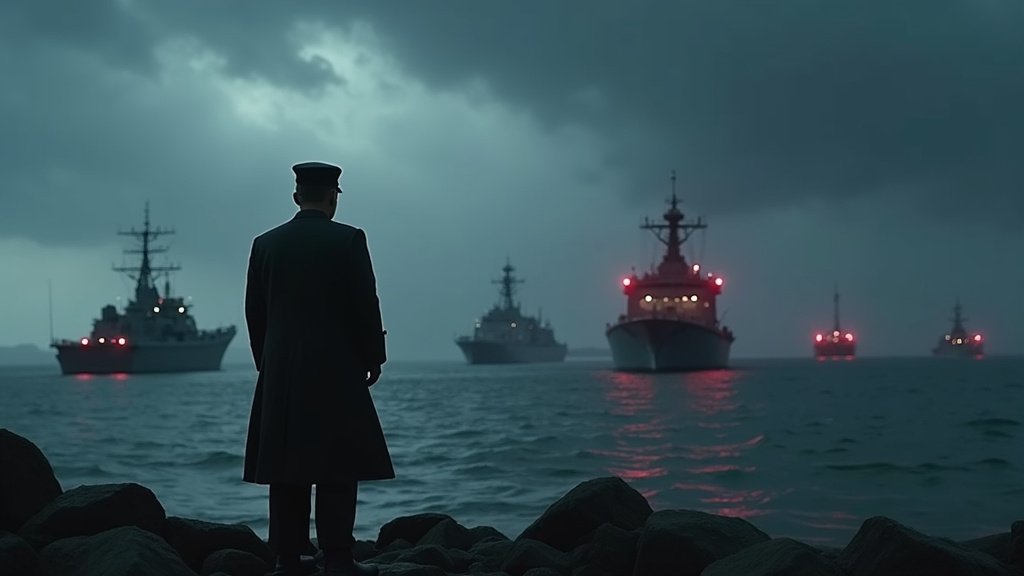SEOUL – Pyongyang has strongly condemned upcoming joint military exercises between the United States, Japan, and South Korea, labeling them a “dangerous” and “reckless show of strength” that escalates regional instability. The sharp rebukes, issued by senior North Korean officials and published by state media on Sunday, September 14, 2025, signal a predictable surge in tensions ahead of the planned drills off South Korea’s Jeju Island.
Pyongyang’s Vehement Opposition
Kim Yo Jong, the influential sister of North Korean leader Kim Jong Un and a key figure in the Workers’ Party of Korea, delivered a scathing assessment of the impending maneuvers. She described the exercises as a “dangerous idea” and warned that the “reckless show of strength made by the U.S., Japan, and South Korea in real action near the DPRK… will inevitably bring bad results to themselves.” Her statements, published by the Korean Central News Agency (KCNA), were echoed by Pak Jong Chon, vice-chairman of the Central Military Commission of the Workers’ Party of Korea. Pak labeled the “Iron Mace” tabletop exercise a “nuclear war rehearsal aimed at using nuclear weapons against the DPRK from A to Z,” while characterizing the trilateral “Freedom Edge” drills as the “most comprehensive and offensive war drill for aggression.”
These official condemnations underscore Pyongyang’s long-standing contention that joint military exercises involving Seoul and Washington are thinly veiled rehearsals for an invasion. North Korea views these drills as a “grave challenge to the security interests of our state and a major danger of undermining regional stability and escalating military tension.”
‘Freedom Edge’ and ‘Iron Mace’: The Drills in Focus
The allied exercises, officially commencing on Monday, September 15, 2025, are scheduled to run through Friday. The “Freedom Edge” exercise is a trilateral outdoor, multi-domain drill involving naval, air, and missile defense components. Concurrently, “Iron Mace” will be a tabletop exercise designed to simulate integrated responses to a nuclear attack. These combined naval, air, and missile defense exercises off the southern coast of Jeju Island are intended to enhance the joint deterrence and response capabilities of the three nations against the escalating threats posed by North Korea.
Geopolitical Undercurrents and Historical Context
This latest exchange of rhetoric occurs within a heightened geopolitical climate. North Korea has engaged in a consistent pattern of weapons testing, most recently overseeing the test of a high-thrust rocket engine on September 9, 2025. The condemnation also arrives amid a backdrop of strengthening ties between North Korea and Russia, including a mutual defense pact signed in mid-2024 and ongoing cooperation that has reportedly provided Pyongyang with critical technology and resources.
Historically, Pyongyang has frequently used joint military drills by the US and South Korea as a pretext for its own military provocations, including missile tests. The recent “Guidelines for Nuclear Deterrence and Nuclear Operations on the Korean Peninsula,” developed by the United States and South Korea, have been specifically cited by North Korea as a “dangerous idea.”
Allies’ Perspective: Deterrence and Defense
Seoul, Tokyo, and Washington maintain that their joint military exercises are purely defensive in nature. The stated goal is to bolster regional security and present a unified front against potential threats from North Korea, China, and Russia. These drills are viewed as a necessary response to North Korea’s continuous development of nuclear weapons and ballistic missile programs, which have raised regional tensions to their highest point in years.
The US-South Korea alliance, strengthened by Japan’s participation, is seen as a crucial instrument for maintaining stability on the Korean Peninsula and addressing broader security concerns in the Indo-Pacific region. The deployment of advanced US military assets, such as midrange missile systems, to the region further underscores this commitment to regional deterrence.
A Trending Global News Development
The escalating rhetoric and synchronized military activities point to a persistent cycle of tension on the Korean Peninsula. As the drills commence, the international community closely watches for any potential North Korean responses, which could involve further weapons tests or diplomatic posturing. This unfolding situation is a significant piece of global news, highlighting the ongoing strategic competition and security challenges in Northeast Asia. The prospect of further military escalation remains a concern as both sides prepare for the exercises, signaling a period of heightened alert and potential volatility. The implications of this ongoing standoff continue to be a trending topic in international affairs, underscoring the delicate balance of power in the region.




